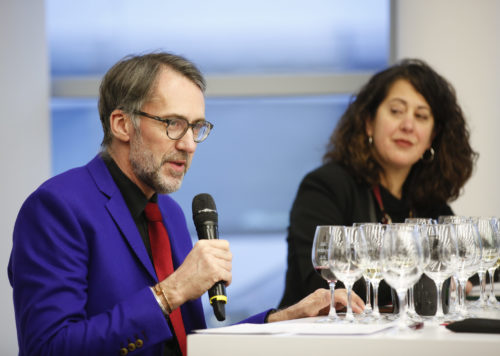By Paula Redes Sidore and Stuart Pigott
The desire to go green is no longer limited to consumers with green politics. A growing awareness of food and beverage safety plus growing awareness of environmental and climate change issues means that an increasing number of consumers are seeking out products made without the use of synthetic chemicals or genetically-modified components. And while up until as recently as 20 years ago, a confrontation with the term “bio” (organic) on the label or the shelf often left the consumer feeling torn between choosing responsibility over quality, that is seldom the case today. There is also a wider recognition that organic wine must be more expensive than non-organic wine, because the organic wine producer has more work in the vineyard.
These trends will be on full display at ProWein 2023. Starting 14 years ago with roughly 120 organic wine producers, their ranks have since blossomed to over 300 producers for the upcoming ProWein. They will be joined by importers and exporters from the relevant associations around the world looking to present “green” wines at the world’s largest industry fair for wines and spirits (March 19–21). The special “Organic World” show (Hall 5, Stand A15-A40) will bring together 40 international exhibitors, offering a fine cap to the trade fair’s organic offerings.
Spain, Italy, France & Austria Leading the Way
Organic viticulture has grown extremely steadily over the last few decades, the upward curve lacking dips or blips. Recent findings from the OIV report that nearly half a million ha of vineyards (6.2% of total vineyard area worldwide) around Planet Wine are now dedicated to organic vines, a number that has tripled since 2008. Italy claimed the highest share (15%) of organic vineyards of any single country, followed by a second place tie from France and Austria at 14%. However the highest amount of organic vineyard area goes to Spain (because of the huge total vineyard area there), which together with fellow leaders Italy and France, together constitute 74% of the world’s total area of organic vines. Germany (9%) has tripled its organic viticulture in the last ten years alone, according to the German Wine Institute. And over the last 25 years, Switzerland (2.8%) has experienced tremendous growth — number three in the world — with its organic holdings increasing from 12 ha to 426 ha. These statistics speak volumes for the seachange in consumer perceptions and priorities.
Broad Spectrum of International Associations
Yet long before anyone was talking about climate change, American puppeteer, Jim Henson, said it best: it’s not easy being green, either as a producer or a consumer. Today more than ever before. The organic path is not a smooth one, rather it is strewn with interpretations, certifications and buzzword debris. Approximately 50% of all EU organic winegrowers are organized in associations. The following is a small alphabetical selection of the over 300 organic exhibitors represented at Prowein 2023. Important to remember is that while the associations each have their own agendas, this is not a hierarchy as some trade members and consumers assume. There is no one size fits all; it’s a question of shades and emphases. The concerns and conditions of producers, say, in the mountains of Switzerland have little to do with the needs of winemakers in say Mediterranean France. However, understanding the approach and focus of each association will help make better informed and responsible choices.
Bio: The term “bio” is protected by EU law throughout Europe. Since 2012, wines produced following the EU guidelines may be marketed under the protected name “organic wine.” These guidelines include a maximum limit for sulfur levels as well as a prohibition of certain additives and genetic engineering. Wines produced according to these guidelines, can be described as bio wine, organic wine or eco wine and labelled with the green EU logo.
Bioland (Hall 5, Stand C 30): The choice to go Bioland means saying no to synthetic chemical nitrogen fertilizers and pesticides. Bioland winegrowers commit to cultivation based on strict guidelines that go far beyond the legal minimum standard for organic foodstuffs. Round about 300 Winegrowers representing have joined the Bioland movement to date.
Demeter (Hall 5, Stand C 19): 25 years ago, Thomas Hartenecke in Baden became the first Demeter certified winemaker in Germany. Today that number is more than 60 wineries, with more than 500 ha. Demeter is a 7,000 member, global biodynamic association and is renowned for having the strictest and most rigid rules, some members also living according to the anthroposophic principles it is based upon.
Ecovin (Hall 5, Stand C 39): Founded in 1985, this is among the largest association of organic wineries worldwide with almost 250 members in Germany where it has deep roots. This is an extremely reliable form of organic certification.
Fair’N Green (Hall 4, Stand A 49): When this association was founded in 2013 some of the established associations dismissed it as pseudo-organic. The emphasis is certainly as much on fair trade practices and sustainability as much as it is on environmental questions. With over 75 members in 2022, the German base of membership has grown rapidly in recent years to include producers in Austria, Switzerland, France, Italy, Portugal and Israel. They cooperate with Geisenheim Wine University.
Vignerons de Nature (Hall 5, Stand C 10): A coalition of roughly 40 French estates, most of whom are focused on export.
Although not present with its own stand, many members of Respekt-Biodyn (including Ökonomierat Rebholz/Germany, Wittmann/Germany, Weingut Loimer/Austria, Bernhard Ott/Austria and Foradori/Italy among others) will be present at ProWein 2023. Founded in 2007, this association highly values the biodynamic approach to organic cultivation and, as a result, holdsn a rather pragmatic view of organic guidelines. The association now has 27 members in Germany, Austria, Italy, Slovenia and Hungary.
When dealing with wine it’s also crucial to remember that there are two pieces to the complex puzzle: vineyard and cellar. As such, one must separate “certified organic” from “organically grown.” The difference being the allowance of additives in the cellar (organically grown) vs not. To help navigate this and other complexities when it comes to wine, the AÖL Rhineland-Palatinate-Saarland (Working Group for Organic Agriculture) together with the federal associations Bioland, Biokreis, Demeter, Ecovin and Naturland, have together created a comprehensive brochure titled “Wein aus Trauben” (http://www.weinaustrauben.de/). This joint project is intended for readers looking to better understand ecological viticulture in Germany, and through a mix of photography and text, better appreciate the complicated journey from grape to glass

